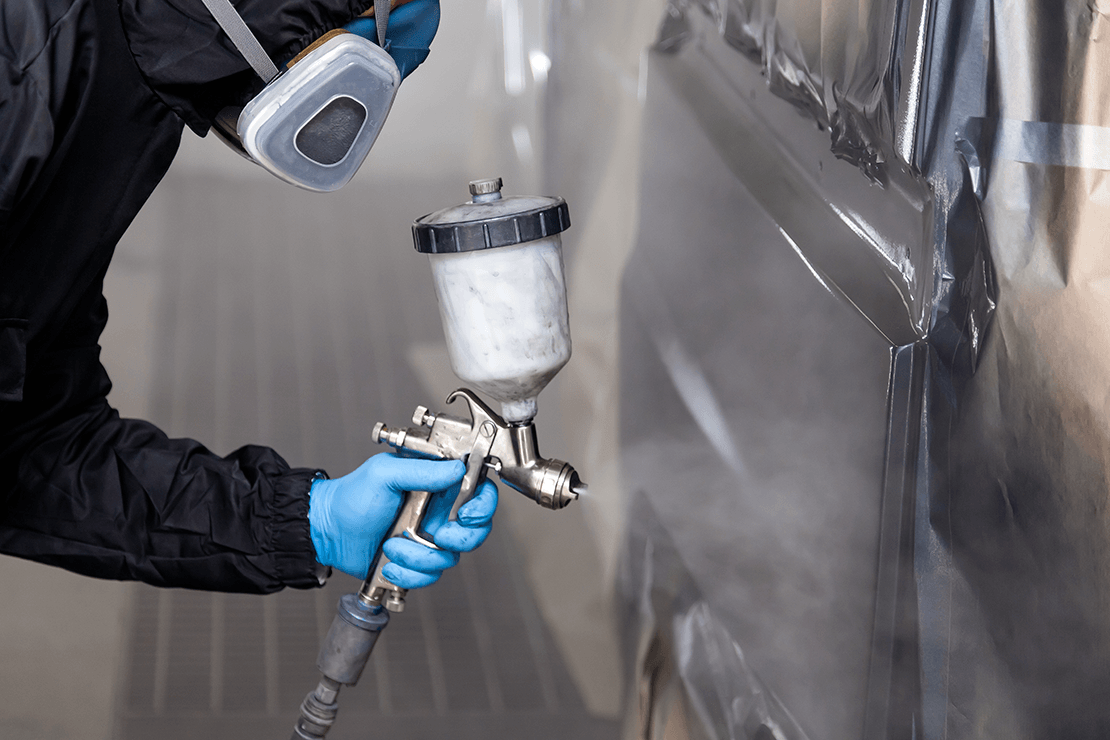Minneapolis works with auto shops to clear the air

The Minneapolis City Council unanimously passed an ordinance amendment requiring all autobody refinishers in the city to convert to either waterborne paint or low-volatile organic compound (VOC) paint. Businesses will have four years to comply with the new requirement with technical and financial assistance available to help make the switch. The ordinance builds upon years of voluntary efforts with businesses through Minneapolis’ Green Cost Share Program.
Why focus on autobody refinishing?
At autobody shops across Minnesota, painters adorn respirators, eye protection, coveralls, and gloves to start their day. This protective attire keeps shop employees safe from the myriad of chemicals and associated air pollution that comes from solvent-based paints used to paint or refinish cars. If you have ever dropped your car off for body work or painting, you might have smelled strong chemical-like odors. Those strong odors, (like the smell of nail polish remover), are from VOCs.
According to the city, 4% of all industrial VOC air pollution in Minnesota comes from the automotive refinishing industry. In Minneapolis, many autobody shops are in neighborhoods already experiencing environmental justice burdens. VOCs are a concern for two reasons: They contribute to the formation of ground-level ozone and individually many are also classified as hazardous air pollutants (HAPs), also known as air toxics. Both ground-level ozone and HAPs can cause serious health effects.
“Environmental justice requires us to take action. That’s why I’m so proud of this ordinance. This new regulation provides us with a framework for addressing the disparate impact of our industrial past by focusing on the communities most impacted by air pollutants while supporting our small business community,” said Minneapolis City Council Member Elliot Payne, author of the ordinance amendment. “This approach leverages our Green Cost Share Program to pull forward needed upgrades, creating a win-win approach to cleaning up our environment.”
“Minneapolis City Council, especially Council Member Payne and Mayor Frey, are championing a nationally leading environmental approach by not only setting new standards but working with small businesses to clean our air and improve worker safety.” said Patrick Hanlon, director of environmental programs for the City of Minneapolis. “The ordinance creation is being led, researched, and executed on a staff level by City of Minneapolis Senior Environmental Research Analyst Jenni Lansing,” he added.
Businesses who have made the switch
The City’s decision to mandate paint changes was not made lightly, and builds upon years of voluntary efforts through Minneapolis’ Green Cost Share Program. Environmental Initiative has partnered with the city to reach out to businesses and encourage them to participate in the program. The organization has helped many businesses in different sectors navigate the application process over the past 10 years.
One of the first autobody shops in the city to make the transition from VOC-based to water-based paint was Oscar Autobody. The shop is in the Whittier neighborhood, just a few blocks away from the Interstate 35W corridor. Owner Ramin Hakimi was interested in making the change because of trends in the industry and anticipation of future mandates. Auto manufacturers have already moved to water-based systems. In addition to air pollution reductions, the new paint system ensures colors are a closer match to the original vehicle’s paint color.
The project was funded through the city’s program, Minnesota Pollution Control Agency grant dollars, and matching funds from the business. Watch more of Ramin’s story →
Next steps for autobody refinishers in Minneapolis
Waterborne paint has become the industry standard for the autobody painting and refinishing industry. Over the next four years, the City of Minneapolis and Environmental Initiative will be working hard to connect remaining businesses with funds and technical assistance to make the switch to waterborne paint.
Businesses can unlock up to $50,000 in funding through the City of Minneapolis Green Cost Share Program to adopt new business practices that reduce exposure to volatile organic compounds (VOCs) for their employees and surrounding community. The Minnesota Pollution Control Agency also provides technical and financial assistance to small businesses interested in reducing emissions.
Contact Christina Vang-Dixon, project manager at Environmental Initiative, with questions or to learn more.
The full ordinance can be viewed on the City of Minneapolis website: Title 3, Chapter 47 of the Minneapolis Code of Ordinances relating to Air Pollution and Environmental Protection: Energy and Air Pollution.